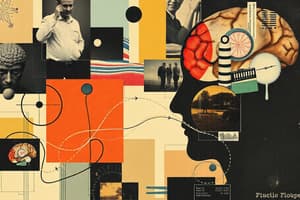Podcast
Questions and Answers
What is the primary focus of psychology as a science?
What is the primary focus of psychology as a science?
- The exploration of philosophical ideas
- The analysis of societal norms
- The study of behavior, brain, and mental processes (correct)
- The study of emotions and feelings
Which of the following is NOT a goal of psychology?
Which of the following is NOT a goal of psychology?
- Predict future events
- Control the spiritual aspects of individuals (correct)
- Describe what is happening
- Explain why something is happening
Which level of analysis is NOT part of psychology's perspectives?
Which level of analysis is NOT part of psychology's perspectives?
- Technological (correct)
- Cultural
- Cognitive
- Physiological
What characterizes the overt actions in the study of psychology?
What characterizes the overt actions in the study of psychology?
What does the term 'theory' refer to in the context of psychology?
What does the term 'theory' refer to in the context of psychology?
What is a primary goal of researchers conducting surveys?
What is a primary goal of researchers conducting surveys?
What is a significant disadvantage of surveys?
What is a significant disadvantage of surveys?
What is the term for when the behavior of subjects changes because they are aware they are being observed?
What is the term for when the behavior of subjects changes because they are aware they are being observed?
In the scientific method, how can observer bias be controlled?
In the scientific method, how can observer bias be controlled?
Which of the following best describes the first step in the scientific method?
Which of the following best describes the first step in the scientific method?
What is the primary goal of descriptive research methods?
What is the primary goal of descriptive research methods?
What is a significant disadvantage of naturalistic observation?
What is a significant disadvantage of naturalistic observation?
Which method involves the observer participating in the group being studied?
Which method involves the observer participating in the group being studied?
What is an advantage of conducting research in a laboratory setting?
What is an advantage of conducting research in a laboratory setting?
Which of the following best describes the limitation of case studies?
Which of the following best describes the limitation of case studies?
What does observer bias refer to in psychological research?
What does observer bias refer to in psychological research?
Which of the following is NOT a descriptive research method?
Which of the following is NOT a descriptive research method?
What is a potential drawback of using laboratory observation?
What is a potential drawback of using laboratory observation?
What type of observation method may help reduce observer bias?
What type of observation method may help reduce observer bias?
Which of the following methods is used to gather information on large groups of people?
Which of the following methods is used to gather information on large groups of people?
Which statement best describes a hypothesis?
Which statement best describes a hypothesis?
What is the independent variable in the hypothesis 'The class is noisier when the teacher is not in the room'?
What is the independent variable in the hypothesis 'The class is noisier when the teacher is not in the room'?
What does the term 'population' refer to in research?
What does the term 'population' refer to in research?
Which hypothesis is focused on a specific prediction rather than general belief?
Which hypothesis is focused on a specific prediction rather than general belief?
What is the dependent variable in research?
What is the dependent variable in research?
In the hypothesis 'Zoey will show more play activities than Hayley because she is more extroverted', what characteristic of Zoey is being tested?
In the hypothesis 'Zoey will show more play activities than Hayley because she is more extroverted', what characteristic of Zoey is being tested?
Which of the following options is a plausible example of a sample?
Which of the following options is a plausible example of a sample?
What is the primary purpose of a hypothesis in scientific research?
What is the primary purpose of a hypothesis in scientific research?
What does a correlation coefficient of 0.0 indicate about the relationship between two variables?
What does a correlation coefficient of 0.0 indicate about the relationship between two variables?
In a positive correlation, when one variable increases, what happens to the other variable?
In a positive correlation, when one variable increases, what happens to the other variable?
What is the primary goal of conducting an experiment in psychology?
What is the primary goal of conducting an experiment in psychology?
Which of the following describes the dependent variable in an experiment?
Which of the following describes the dependent variable in an experiment?
What is an example of an independent variable in an experiment focused on aggressive behavior?
What is an example of an independent variable in an experiment focused on aggressive behavior?
What misconception about correlation and causation is important to remember?
What misconception about correlation and causation is important to remember?
Which statement correctly describes the experimental group in an experiment?
Which statement correctly describes the experimental group in an experiment?
What does a correlation closer to +1.00 or -1.00 indicate about the strength of a relationship?
What does a correlation closer to +1.00 or -1.00 indicate about the strength of a relationship?
Flashcards are hidden until you start studying
Study Notes
Psychology: More Than Common Sense
- Psychology is the scientific study of behavior, brain, and mental processes.
- Behavior is outward or overt actions and reactions.
- Mental processes are internal, covert activities of our minds
- Psychology aims to describe, explain, predict, and control behavior.
- A theory is a general explanation of a set of observations.
Levels of Analysis in Psychology
- Psychology offers different perspectives on behavior, from the "neuron to the neighborhood."
- Each level of analysis provides a perspective for describing, explaining, and predicting behavior.
- Levels of analysis include cultural, social, behavioral, cognitive, and physiological perspectives.
The Scientific Method
- A hypothesis is a testable prediction about the relationship between variables.
- A population is the entire group an investigator wants to draw conclusions from.
- A sample is a subset of the population that the investigator studies.
Research Methods in Psychology
- Psychological research methods are used to study behavior and mental processes.
- Descriptive methods aim to describe a phenomenon.
- Correlational methods measure the relationship between two variables.
- Experimental methods manipulate a variable to see if it causes a change in behavior.
Descriptive Methods
- Descriptive methods include observation, surveys, and case studies.
- Observation can be naturalistic or laboratory.
- Naturalistic observation involves observing behavior in the natural environment.
- Laboratory observation involves observing behavior in a controlled environment.
- Case studies involve studying one individual in great detail.
- Surveys involve asking a series of questions about a topic under study.
Naturalistic Observation
- Advantages include providing a realistic picture of behavior.
- Disadvantages include the observer effect (people behave differently when they know they are being watched).
- Participant observation is a form of naturalistic observation where the observer becomes part of the group being observed.
- Observer bias is the tendency of observers to see what they expect to see.
- Blind observers are people who don't know the research question to reduce observer bias.
Laboratory Observation
- Advantages include control over the environment and the use of specialized equipment.
- Disadvantages include the possibility of artificial behavior due to the artificial setting.
Case Study
- Advantages include providing a tremendous amount of detail.
- Disadvantages include the inability to generalize the findings to other people.
Survey
- Advantages include gathering data from large numbers of people and studying covert behaviors.
- Disadvantages include the need for a representative sample to ensure meaningful results and the possibility of inaccurate responses due to courtesy bias.
Correlation
- Correlation measures the relationship between two variables.
- The correlation coefficient (r) represents the direction and strength of the relationship.
- A positive correlation indicates that the variables are related in the same direction.
- A negative correlation indicates that the variables are related in opposite directions.
- Correlation does not imply causation.
Experiment
- An experiment manipulates a variable to see if it causes a change in behavior.
- The independent variable is manipulated by the experimenter.
- The dependent variable is the measurable response or behavior of the subjects.
- The experimental group is the group of subjects who are exposed to the independent variable.
- Operational definition is a definition of a variable of interest that allows it to be directly measured.
Studying That Suits You
Use AI to generate personalized quizzes and flashcards to suit your learning preferences.




